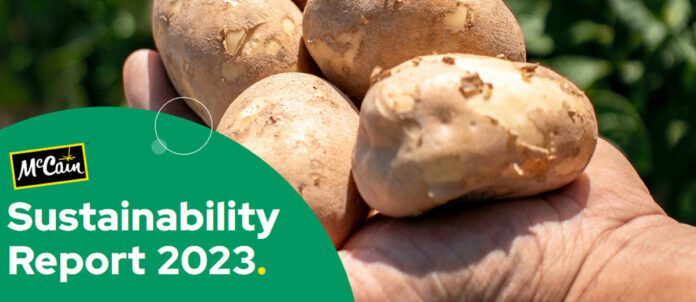TORONTO — McCain Foods has released its annual Global Sustainability Report, which includes results from the past fiscal year.
With a goal of implementing re-generative agriculture practices across 100 per cent of the global acreage that grows potatoes for McCain products by the end of the decade, 51 per cent of McCain’s global potato acreage has on boarded within its Re-generative Agriculture Framework, and 28 per cent has moved up the framework towards more comprehensive adoption of re-generative practices.
McCain is accelerating the adoption of re-generative agriculture practices through its direct relationships with farmers — a network of 3,500 partners around the world — by providing technical and educational assistance and developing innovative financing solutions to offset costs associated with making changes in farming practices and adopting new technologies.
In the report, McCain highlights the following results across four key pillars:
Smart and Sustainable Farming
In addition to progressing on commitments towards re-generative agriculture, McCain has completed its first season at Farm of the Future Africa and third season at Farm of the Future Canada, improved water-use efficiency in water-stressed regions by 9.4 per cent, delivered more than 23,500 hours of training to farmers and has achieved its goal to ensure 21.9 per cent of the potatoes grown for McCain are water stress-tolerant varieties.
Resource-Efficient Operations
More than 21 per cent of the electrical energy used by McCain was from renewable sources and absolute carbon emissions (Scope 1 and 2) reduced by 9.8 per cent from 2017. McCain has also achieved a 16.3 per cent improvement in water-use efficiency in priority plants. Additionally, 98.5 per cent of McCain’s paper packaging and 87.8 per cent of its plastic packaging are designed for recycling.
Good Food
The company launched new global policies for clean ingredients and nutrition, while maintaining 100 per cent Global Food Safety Initiative (GFSI) certification at all McCain-owned facilities and 96 per cent GFSI certification of all Tier 1 ingredient-supplier facilities. Sodium was reduced by 6.6 per cent in McCain-branded appetizer products, and the company has continued to remove artificial ingredients from key products.
Thriving Communities
In 2023, McCain employees provided more than 17,000 volunteer hours through the McCain Chips In initiative, reached 2,716 new beneficiaries with development programs and partnerships and donated the equivalent of 11.9 million meals.
“As one of the most vulnerable sectors impacted by climate change, the food system is one of the most important levers to help drive a sustainable and resilient future,” says Max Koeune, president and CEO of McCain Foods. “That’s why sustainability is at the heart of our purpose as a business. We’re pleased to share an update on how we’re making strides towards our goals in key areas that will ensure we have resource efficient operations, are farming in a smart and sustainable way and are contributing to building thriving communities in the areas that we operate, all while we continue to produce good food.”
To access the report, click here.


















